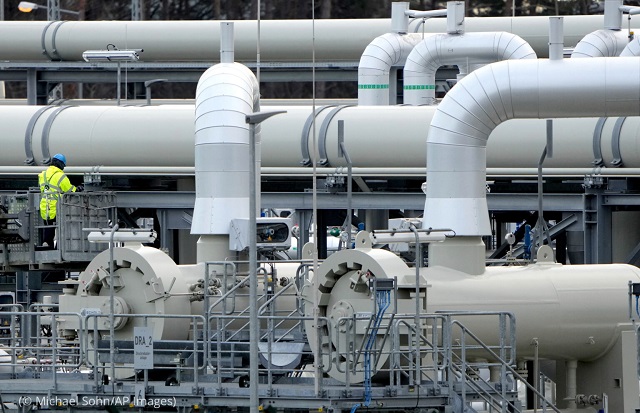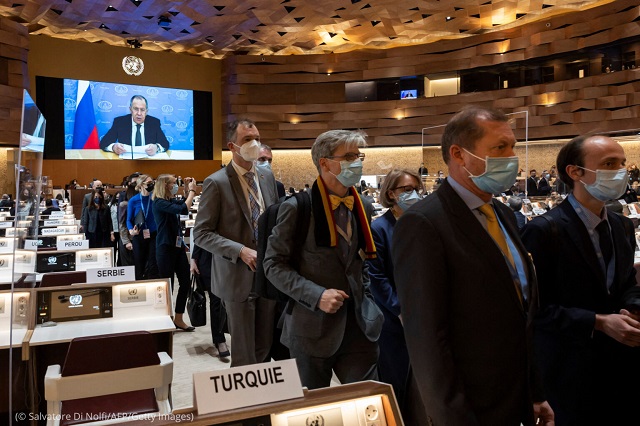Countries worldwide are taking action to deter Russian President Vladimir Putin from continuing his war in Ukraine.
More than 30 countries have announced strong sanctions and export controls targeting Russia, presenting a united front against Russia’s aggression.
The United States, Australia, Canada, France, Germany, Italy, Japan, South Korea, Singapore, Switzerland, the United Kingdom and the European Commission are among those that took action against Russian banks, businesses, oligarchs and Putin.
In the face of international pressure, the Russian ruble dropped 30% and the country’s stock market was suspended February 28.
We “are inflicting pain on Russia and supporting the people of Ukraine,” President Biden said in his State of the Union address March 1. “Putin is now isolated from the world more than he has ever been.”
Targeting financial sectors
Japan, alongside the United States and like-minded nations, quickly imposed sanctions on Russia — including export controls on key inputs like semiconductors. Tokyo restricted transactions with the Russian Central Bank and joined the United States, the European Union and others in blocking Russian banks’ access to the global financial messaging system called SWIFT.
Before Russia’s invasion of Ukraine, Japan had already agreed to divert liquified natural gas shipments to Europe to support energy markets amid the crisis.
South Korea also joined the United States and other nations in imposing economic sanctions on Russia, blocking financial transactions with major Russian banks. It also supported denying certain Russian banks access to SWIFT.
On February 27, Norwegian Prime Minister Jonas Gahr Støre announced plans to divest the country’s sovereign wealth fund of more than $2.8 billion in Russian assets, Bloomberg reports.
Here are some other actions individual nations are taking to hold Putin accountable:
Stopping energy imports

Germany has suspended plans for the Nord Stream 2 gas pipeline in response to Russia’s aggression. (© Michael Sohn/AP Images)
As the threat of Russia’s invasion of Ukraine loomed, Germany began taking steps to stop the Nord Stream 2 gas pipeline.
After the invasion, German Chancellor Olaf Scholz announced new initiatives to meet Germany’s energy needs without Russian natural gas, including plans to build two liquefied natural gas terminals and increase natural gas reserves, the Financial Post reports.
Banning flights
Over 40 countries and territories, including the United States, have banned Russian aircraft from their airspace. European Commission President Ursula von der Leyen said February 27 that Russian planes, “including the private jets of oligarchs” could not take off, land or overfly the European Union.
First, we are shutting down the EU airspace for Russian-owned, Russian registered or Russian-controlled aircraft.
They won’t be able to land in, take off or overfly the territory of the EU.
Including the private jets of oligarchs. pic.twitter.com/o551M9zekQ— Ursula von der Leyen (@vonderleyen) February 27, 2022
Dropping state media
Canadian television stations dropped RT (formerly Russia Today) after Canadian government officials announced they would seek to remove Russian state-run broadcasting from the country’s airwaves, Bloomberg reports. One Canadian television provider added a Ukrainian channel for free.
Online streaming services Netflix and YouTube have also moved to drop Russian state channels, including RT, according to news reports.
In a February 26 joint statement, the leaders of the United States, Canada, France, Germany, Italy, the United Kingdom and the European Commission said they were prepared to take further measures to hold Russia to account for its attack on Ukraine.
“We will hold Russia to account and collectively ensure that this war is a strategic failure for Putin,” the leaders said.
Isolating Russia in international organizations
International organizations also took action. At an emergency session of the United Nations General Assembly March 2, member states voted 141-5 in favor of a resolution that reaffirmed Ukraine’s sovereignty and condemned Russia’s invasion.

Delegates walk out as Russian Foreign Minister Sergey Lavrov addresses the U.N. Human Rights Council March 1 in Geneva. (© Salvatore Di Nolfi/AFP/Getty Images)
Also on the international front:
- The International Civil Aviation Organization on February 25 condemned Russia’s violation of Ukraine’s sovereignty and airspace.
- The International Atomic Energy Agency convened a meeting March 2 to debate a resolution critical of Russia’s invasion of Ukraine.
Banner image: A sign at Los Angeles International Airport notifies passengers of canceled Russian airline Aeroflot flights March 2 after President Biden closed U.S. airspace to Russian aircraft March 1. (© Mario Tama/Getty Images)
The original article is here on ShareAmerica.







COMMENTS0
LEAVE A COMMENT
TOP